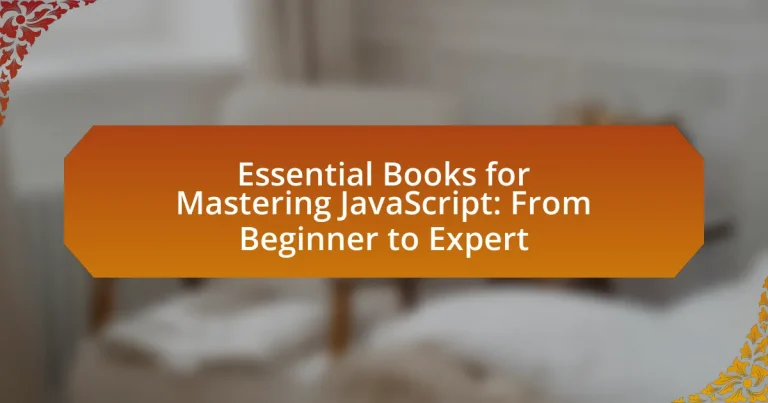The article focuses on essential books for mastering JavaScript, catering to learners from beginner to expert levels. Key titles include “Eloquent JavaScript,” “You Don’t Know JS,” and “JavaScript: The Good Parts,” each offering unique insights and practical exercises tailored to different skill levels. The article discusses how these resources enhance learning outcomes, the importance of selecting appropriate materials, and strategies for effective study and retention. Additionally, it highlights common pitfalls learners face and best practices for integrating book knowledge with practical coding experience.

What are the Essential Books for Mastering JavaScript?
The essential books for mastering JavaScript include “Eloquent JavaScript” by Marijn Haverbeke, which provides a comprehensive introduction to the language and programming concepts. Another key resource is “You Don’t Know JS” by Kyle Simpson, a series that delves deeply into the mechanics of JavaScript, enhancing understanding of its intricacies. Additionally, “JavaScript: The Good Parts” by Douglas Crockford focuses on the best features of JavaScript, promoting effective coding practices. These books are widely recognized in the programming community for their clarity and depth, making them invaluable for learners at all levels.
How do these books cater to different skill levels?
These books cater to different skill levels by offering a range of content that addresses the needs of beginners, intermediates, and advanced learners. For beginners, the books provide foundational concepts, simple examples, and step-by-step instructions to build confidence and understanding. Intermediate books introduce more complex topics, such as asynchronous programming and design patterns, while also including practical exercises to enhance skills. Advanced books delve into intricate subjects like performance optimization and advanced frameworks, often featuring real-world applications and case studies to challenge experienced developers. This structured approach ensures that learners at all levels can find appropriate resources to advance their JavaScript mastery effectively.
What beginner books are recommended for those new to JavaScript?
“JavaScript: The Good Parts” by Douglas Crockford and “Eloquent JavaScript” by Marijn Haverbeke are highly recommended beginner books for those new to JavaScript. “JavaScript: The Good Parts” focuses on the core features of JavaScript, providing a clear understanding of the language’s strengths and best practices. “Eloquent JavaScript” offers a comprehensive introduction, combining theory with practical exercises, making it suitable for beginners. Both books are widely recognized in the programming community for their clarity and effectiveness in teaching JavaScript fundamentals.
Which intermediate books help bridge the gap to advanced concepts?
“JavaScript: The Good Parts” by Douglas Crockford and “You Don’t Know JS” series by Kyle Simpson are two intermediate books that effectively bridge the gap to advanced JavaScript concepts. “JavaScript: The Good Parts” focuses on the core features of JavaScript, emphasizing best practices and efficient coding techniques, which are essential for mastering the language. The “You Don’t Know JS” series delves deeply into the mechanics of JavaScript, covering topics such as scope, closures, and asynchronous programming, providing a comprehensive understanding necessary for advanced development. Both books are widely recommended by experts in the field and have been influential in shaping modern JavaScript practices.
What advanced books are essential for expert-level mastery?
“JavaScript: The Good Parts” by Douglas Crockford is essential for expert-level mastery. This book distills the core features of JavaScript, emphasizing best practices and avoiding pitfalls, which is crucial for advanced developers. Additionally, “You Don’t Know JS” series by Kyle Simpson provides an in-depth exploration of JavaScript mechanics, covering topics like scope, closures, and asynchronous programming, which are vital for mastering the language. Lastly, “Eloquent JavaScript” by Marijn Haverbeke offers advanced insights into functional programming and the intricacies of the language, making it a valuable resource for experts. These books collectively enhance understanding and proficiency in JavaScript, supporting expert-level development.
Why is it important to choose the right JavaScript books?
Choosing the right JavaScript books is crucial for effective learning and skill development in programming. The right books provide accurate information, structured learning paths, and practical examples that align with current industry standards. For instance, books that are updated regularly reflect the latest features and best practices in JavaScript, ensuring learners are not misled by outdated content. Additionally, well-reviewed books often include exercises and projects that reinforce concepts, which is essential for mastering the language. Selecting high-quality resources can significantly impact a learner’s ability to apply JavaScript effectively in real-world scenarios.
How do the right resources impact learning outcomes?
The right resources significantly enhance learning outcomes by providing accurate information, structured guidance, and practical examples. For instance, well-curated books on JavaScript, such as “Eloquent JavaScript” by Marijn Haverbeke, offer comprehensive explanations and exercises that facilitate deeper understanding and skill development. Research indicates that learners using high-quality resources demonstrate improved retention and application of knowledge, as evidenced by a study published in the “Journal of Educational Psychology,” which found that students exposed to effective learning materials scored 20% higher on assessments compared to those using subpar resources. Thus, the quality of educational resources directly correlates with the effectiveness of learning experiences and outcomes.
What criteria should be considered when selecting JavaScript books?
When selecting JavaScript books, consider the author’s expertise, the book’s target audience, and the publication date. Author expertise ensures the content is credible and reliable; for instance, books written by recognized figures in the JavaScript community, such as Douglas Crockford or Kyle Simpson, often provide valuable insights. The target audience is crucial because books aimed at beginners will differ significantly from those intended for advanced users, ensuring the material matches the reader’s skill level. Lastly, the publication date is important as JavaScript evolves rapidly; books published within the last few years are more likely to cover the latest features and best practices, making them more relevant.

What are the Key Features of Recommended JavaScript Books?
Key features of recommended JavaScript books include comprehensive coverage of fundamental concepts, practical examples, and hands-on exercises. These books typically provide clear explanations of core topics such as variables, functions, and object-oriented programming, ensuring that readers grasp essential principles. Additionally, many recommended titles incorporate real-world projects that allow learners to apply their knowledge, enhancing retention and understanding. Furthermore, updated editions often reflect the latest JavaScript standards and best practices, ensuring relevance in a rapidly evolving field. For instance, “Eloquent JavaScript” by Marijn Haverbeke is praised for its engaging style and depth, while “You Don’t Know JS” series by Kyle Simpson delves into advanced topics, making them suitable for both beginners and experienced developers.
How do these books enhance the learning experience?
These books enhance the learning experience by providing structured content that progresses from fundamental concepts to advanced techniques in JavaScript. The clear organization allows learners to build a solid foundation before tackling more complex topics, facilitating better retention and understanding. For instance, books often include practical examples and exercises that reinforce learning through application, which has been shown to improve skill acquisition in programming (as supported by research from the Journal of Educational Psychology). Additionally, many of these resources incorporate real-world scenarios, making the material relevant and engaging, which further motivates learners to practice and apply their knowledge effectively.
What role do practical exercises play in mastering JavaScript?
Practical exercises are crucial for mastering JavaScript as they facilitate hands-on learning and reinforce theoretical concepts. Engaging in coding challenges and projects allows learners to apply their knowledge in real-world scenarios, enhancing problem-solving skills and understanding of language syntax. Research indicates that active participation in coding exercises significantly improves retention rates, with studies showing that learners who practice coding regularly outperform those who rely solely on passive learning methods. This active engagement solidifies foundational skills and prepares individuals for more complex programming tasks.
How do real-world examples contribute to understanding JavaScript?
Real-world examples enhance understanding of JavaScript by providing practical applications of theoretical concepts. These examples illustrate how JavaScript functions in actual scenarios, making abstract ideas more tangible. For instance, when learners see how JavaScript is used to create interactive web pages or manage data in applications, they can better grasp its syntax and functionality. Studies show that contextual learning, such as applying programming concepts to real-world tasks, significantly improves retention and comprehension, as evidenced by research from the Journal of Educational Psychology, which highlights the effectiveness of experiential learning in programming education.
What additional resources do these books provide?
These books provide additional resources such as online tutorials, coding exercises, and access to community forums. For instance, many titles include links to supplementary websites where readers can practice coding in real-time, enhancing their learning experience. Additionally, some books offer downloadable content, including sample code and project templates, which facilitate hands-on practice. These resources are designed to reinforce the concepts covered in the texts and provide practical applications, making the learning process more effective.
How do online communities and forums complement book learning?
Online communities and forums complement book learning by providing interactive platforms for discussion, clarification, and practical application of concepts. These platforms allow learners to ask questions, share experiences, and receive feedback, which enhances understanding beyond the static information found in books. For instance, a study by the Pew Research Center found that 73% of online users engage in forums to seek advice or share knowledge, indicating the value of peer interaction in the learning process. Additionally, forums often feature real-time problem-solving and collaborative projects, which can reinforce and contextualize the theoretical knowledge gained from books on JavaScript.
What supplementary materials are often included with these books?
Supplementary materials often included with books on mastering JavaScript typically consist of code examples, exercises, quizzes, and access to online resources such as video tutorials or forums. These materials enhance the learning experience by providing practical applications of the concepts discussed in the text, allowing readers to practice and reinforce their understanding. For instance, many JavaScript books offer downloadable code snippets that readers can run and modify, which aids in hands-on learning. Additionally, some books may include companion websites that host interactive coding environments or additional tutorials, further supporting the reader’s journey from beginner to expert.

How Can Readers Maximize Their Learning from JavaScript Books?
Readers can maximize their learning from JavaScript books by actively engaging with the material through practical exercises and projects. This approach reinforces concepts and enhances retention, as studies show that hands-on practice significantly improves understanding in programming. Additionally, readers should take notes, summarize key points, and revisit challenging topics to solidify their knowledge. Research indicates that spaced repetition and active recall techniques can further enhance memory retention, making these strategies effective for mastering JavaScript concepts.
What strategies can be employed for effective study?
Effective study strategies include active learning, spaced repetition, and the use of practice tests. Active learning engages students in the material through discussions, teaching others, or applying concepts to real-world scenarios, which enhances retention. Spaced repetition involves reviewing material at increasing intervals, which has been shown to improve long-term memory retention, as supported by research from Cepeda et al. (2006) in “The Effect of Spacing on the Learning of Information.” Additionally, practice tests not only assess knowledge but also reinforce learning, as demonstrated by Roediger and Butler (2011) in their study “The Critical Importance of Retrieval for Learning.” These strategies collectively enhance understanding and retention of complex subjects like JavaScript.
How can readers create a structured learning plan using these books?
Readers can create a structured learning plan using these books by first identifying their current skill level in JavaScript and then selecting books that align with their learning goals. For beginners, starting with foundational texts that cover basic concepts and syntax is essential, such as “Eloquent JavaScript,” which provides a comprehensive introduction. Intermediate learners should focus on books that delve into more complex topics, like “You Don’t Know JS,” which explores deeper aspects of the language.
To structure the learning plan, readers should allocate specific time blocks for reading and practice, ensuring they apply concepts through coding exercises. Incorporating a mix of theoretical reading and practical application reinforces learning. Additionally, setting milestones, such as completing a chapter or project, helps track progress. This methodical approach, supported by the structured content of the selected books, enables readers to build their JavaScript skills effectively.
What techniques can enhance retention of JavaScript concepts?
Active learning techniques such as spaced repetition, hands-on coding practice, and teaching concepts to others can significantly enhance retention of JavaScript concepts. Spaced repetition involves reviewing material at increasing intervals, which has been shown to improve long-term memory retention. Hands-on coding practice allows learners to apply concepts in real-world scenarios, reinforcing understanding and retention. Teaching concepts to others solidifies knowledge, as explaining material requires a deeper comprehension. Research indicates that active engagement with material leads to better retention outcomes, making these techniques effective for mastering JavaScript.
What common pitfalls should learners avoid when using these books?
Learners should avoid the pitfall of not practicing coding alongside reading the books. Engaging with the material through hands-on coding is essential for reinforcing concepts and developing practical skills. Research indicates that active learning, such as coding exercises, significantly enhances retention and understanding of programming languages like JavaScript. Additionally, learners should be cautious of skipping foundational topics, as a lack of understanding in basic concepts can lead to confusion with more advanced material. Studies show that a solid grasp of fundamentals is crucial for mastering complex programming tasks.
How can over-reliance on books hinder practical coding skills?
Over-reliance on books can hinder practical coding skills by limiting hands-on experience and real-world problem-solving. When learners focus primarily on theoretical knowledge from books, they may struggle to apply concepts in practical scenarios, which is essential for mastering coding. Research indicates that active learning, such as coding projects and collaborative exercises, significantly enhances skill retention and application. For instance, a study by the National Training Laboratory found that learners retain only 10% of information from reading, compared to 75% from practice-based learning. Therefore, while books provide valuable foundational knowledge, they cannot replace the necessity of practical coding experience.
What mistakes do beginners often make when learning JavaScript?
Beginners often make the mistake of not understanding the fundamentals of JavaScript, such as variable scope and data types. This lack of foundational knowledge leads to errors in code execution and logic. For instance, many beginners confuse var, let, and const, which can result in unexpected behavior due to differences in scope and hoisting. Additionally, beginners frequently overlook the importance of asynchronous programming, leading to issues with callbacks and promises. According to a survey by Stack Overflow, 50% of developers reported struggling with asynchronous code, highlighting its complexity for newcomers. Understanding these core concepts is essential for effective JavaScript programming.
What are the best practices for integrating book learning with coding?
The best practices for integrating book learning with coding include applying concepts through hands-on projects, regularly practicing coding exercises, and utilizing code examples from the book. Engaging with the material actively enhances retention and understanding. For instance, when studying JavaScript, readers should implement code snippets in a development environment to see real-time results, which reinforces learning. Additionally, pairing theoretical knowledge with practical application, such as building small applications or contributing to open-source projects, solidifies the connection between book learning and coding skills. This approach is supported by educational research indicating that active learning techniques significantly improve comprehension and skill acquisition in programming.


